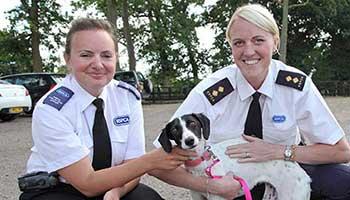43 pedigree cats found living in squalor in County Durham
30.06.25
A couple who kept 43 pedigree cats in appalling conditions at their home in Chester-le-Street have been disqualified from keeping animals for three years.
Many of the Maine Coon and Ragdoll cats, several of whom were pregnant, had multiple health issues, and the majority of kittens that were born then died because they were so poorly.
At a hearing at Peterlee Magistrates Court on 11 June, Ernest Frost (Date of Birth 10/02/1954) and Jean Frost (Date of Birth 21/01/1957) were banned from keeping animals for three years after pleading guilty to one Animal Welfare Act offence following an investigation and prosecution by the RSPCA.
The court was told that RSPCA Inspector Rowena Proctor went to the couple's house on 21 February this year following welfare concerns for ten cats who were thought to be living there. The officer immediately called the police to gain access because of the awful smell coming from outside and the large amount of faeces seen through the patio doors.
In her written evidence to the court, the Inspector said: "The smell inside was worse than the smell of any property I have ever been into. The conditions were appalling, with faeces covering the majority of the floors, window sills and up the walls.
"There was no visibly clean area anywhere aside from blankets on the sofa and some clean dishes on the side in the kitchen. I was immediately concerned for some kittens on the sofa who were in really poor condition. Several had their eyes sealed shut with discharge. One grey kitten in particular looked close to death, with its head back and open mouth, breathing.
"The property had three floors, but the landing area between the middle and top floor was so littered with rubbish and faeces that it was impossible to walk over without feeling like the floor would cave in, presumably due to ammonia damage, so I did not manage to access the top floor at all. My throat burned and my eyes watered due to the huge amount of ammonia in the air."
Magistrates were told that 35 male and female cats - ranging in age from three weeks to six years - were removed from the house because of welfare concerns and taken for immediate veterinary treatment. A further cat was caught when the Inspector returned to the house the following day, and Frost handed over an additional seven at a later date.
The vet who examined the majority of them said it was likely from their symptoms that several infectious diseases were circulating within the household. Many of the younger animals were showing symptoms of conjunctivitis, which is often caused by calicivirus, and is a component of the highly infectious cat flu.
The kitten seen at the house with breathing difficulties was so poorly that he was put to sleep immediately by the vet to prevent further suffering, and two others passed away after being hospitalised. Several of the adult cats had severe dental disease and decaying teeth, which needed to be removed. Others had fur matted with faeces and urine scalding on their paws and legs. A large number had reddened and inflamed gums and flea allergies. One female cat required surgery for a retained placenta, and another needed emergency treatment for a serious uterine infection.
In her written evidence to the court, the vet said: "Many of these cats were in poor body condition and were underweight. This is an excessive number of cats to keep in one household and will have caused direct psychological suffering to all of them. Cats do not enjoy living in large groups and find being forced to do so very stressful.
"Several of them passed diarrhoea during the examinations. As live worms were also present, this was likely a contributing factor. Live fleas and flea dirt were found on the coat of many of these cats.
The nursing and pregnant females were cared for at the RSPCA's Felledge Animal Centre. The majority of kittens who were born sadly died because of severe health issues. Two poorly adult cats, one of whom had given birth, were also put to sleep the following month with Jean Frost's consent.
In her interview with the RSPCA, Jean Frost said she wasn't a cat breeder and that all the litters were unintentional. She said only two of the felines were neutered and she had "possibly lost track" of how many she had. She said she didn't believe any of the kittens should have seen a vet sooner, although she was going to take them "as soon as possible."
In his interview, Ernest Frost said he thought the kittens looked "alright" and the cats were "definitely not suffering", and they were managing the number they had. He said he had no involvement with their breeding or showing and it was his wife who took them to the vet. He stated conditions had deteriorated because they were both unwell.
All of the surviving cats were looked after at RSPCA animal centres and private boarding establishments up and down the country. The majority have already been adopted. Ten cats, which Jean Frost refused to sign over, can also now be legally rehomed by the charity after the court imposed a deprivation order.
Both were also ordered to pay £150 costs and in mitigation, the court was told the couple were in poor health.
Speaking after the court hearing, Inspector Proctor said: "Over the years I have been to countless properties where conditions have been very bad, but this was by far the worst smell I have encountered in eight years as an RSPCA Inspector.
"The cats were living in wholly unacceptable conditions, and there were far too many for the defendants to be able to manage and care for properly. Breeding had spiralled out of control, infection and disease were rife, and many of the kittens born into this environment were very poorly as a result.
"Even though they couldn't all be saved, the vast majority made a good recovery and I'd like to say a huge thank you to all the private boarding establishments and RSPCA centres who cared for the cats in this case, and to the many adopters who have welcomed them into their lives."


